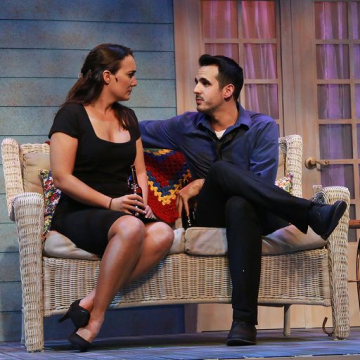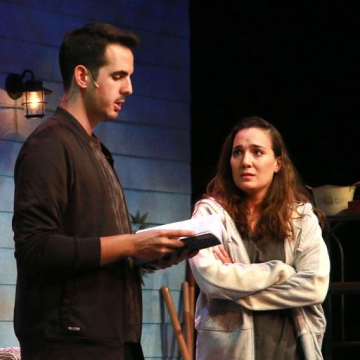
Left, Robert (Michael McKenzie) and Catherine (Jessica Sanford) as father and daughter in Actors' Playhouse production of "Proof." Right, Claire (Stephanie White) and her sister, Catherine, (Jessica Sanford) share a sibling moment. (Photos by Alberto Romeu).
Certain and clear, 100-percent proof elude most of us. And the characters in David Auburn’s Pulitzer Prize, and Tony Award-winning play, “Proof” are no different.
But while it is hard to guarantee anything, you are likely to relate, on some level, to the action and characters populating Auburn’s layered, suspenseful, touching, and comic piece. It is receiving an engrossing and believable production through Sunday, June 4 at Actors’ Playhouse at the Miracle Theatre in Coral Gables.
A skilled quartet of actors disappears into their relatable, well-drawn characters. And under Actors’ Playhouse Artistic Director David Arisco’s careful direction, the production unfolds as seamlessly as a documentary.
“Proof” a character-driven piece, is thoroughly relatable and as riveting as an Agatha Christie or John Grisham mystery. In addition, it is as neatly structured as a well-thought-out mathematical equation leading to a logical, undisputed answer.
Some may feel that math and science are topics that are too dry for live theater. And while “Proof” deals with mathematics, it is hardly a dense, dull play. Indeed, the piece tackles with unflinching honesty serious and relevant themes. They include uncertainty, mental illness, caring for aging, ill parents, adult sibling conflicts, death and mourning, the competitive world of academia, legacy, the frailties of the human body, life’s frailty, and the mixed blessings and curses of genetics.

Catherine (Jessica Sanford) and graduate student Hal (Daniel Llaca) discuss the facts or lack thereof. (By Alberto Romeu).
Impressively and surprisingly, Auburn packs so much into his play, yet it never feels jumbled. In fact, the play is easy to follow despite several flashbacks. In addition, Auburn limits technical terms and doesn’t require you to be knowledgeable in mathematics to derive meaning from his roughly two-and-a-quarter-hour play. With that said, it may be helpful to know that a proof is the logical way in which mathematicians demonstrate that a statement is true.
The narrative structure of “Proof,” which jumps back and forth in time, seamlessly demonstrates how one development could logically lead to another.
“Proof” takes place during the early 2000s in the Chicago area. When the play opens, Catherine is 25 and her father, Robert, a brilliant but troubled mathematician, has just died.
Catherine, herself a genius in mathematics, has spent the last several years caring for Robert. At some point, he developed an unnamed debilitating and degenerative mental illness. As a result, Robert’s ability to produce cohesive work has suffered. Also, the illness imbued him with the need to write compulsively; he filled hundreds of notebooks with nonsense. But after a graduate mathematics student who studied under Robert discovers an ingenious proof amid the notebooks, Catherine claims she wrote it. But nobody believes her.

Robert played by Michael McKenzie and Catherine played by Jessica Sanford are father and daughter in Actors' Playhouse's production of "Proof." (Photo by Alberto Romeu)
Can Catherine prove that she authored the proof? Could Robert have written such a brilliant proof during the time that he suffered from mental illness? Is it possible that Catherine, with her limited experience compared to her father, wrote the potentially groundbreaking proof? After all, she gave up her education to care for her father. As a result, she spent less than a year studying as an undergraduate. Even at the end, we are not 100 percent certain about what is true. Rather, as is the case with much of life, we must deal with the uncertainty that we feel following the inconclusive ending.
As part of his smart structure, Auburn reveals a surprising plot twist immediately before intermission. As a result, we’re eager to return to the action.
While “Proof” is unflinchingly honest, it reminds us that we are not alone in our fears. Specifically, Catherine worries that she will follow in her father’s footsteps. That is, she will descend into madness after quickly rising as a star mathematician. But which of her father’s genes did she inherit? Those that made him a genius or those that caused his illness? Is it possible that she inherited a combination of the two? Auburn does not offer easy answers (not that any exist).
Unquestionably, “Proof” deals with dark, potentially depressing subject matter. However, Auburn leavens the play with enough humor to make the piece more than bearable.
Almost six years ago, Ft. Lauderdale’s New City Players staged an impressive production of “Proof.” The mounting featured a minimal set that was more symbolic than realistic. By contrast, Arisco and scenic designer Gene Seyffer decided on a real-looking set that depicts Robert’s porch. It includes details such as plants, tools, chairs, and pillows for the chairs. The colors are light and dark, perhaps symbolizing the fact that people suffering from mental illness experience good and bad days. The play takes place solely on the porch, which lighting designer Eric Nelson illuminates with realistic lighting.

A troubled Catherine (Jessica Sanford) speaks with Hal (Daniel Llaca). (Photo by Alberto Romeu)
The actors, clad in costume designer Ellis Tillman’s varied, character-appropriate clothing, deliver convincing performances during which they not only speak and move, but listen to each other.
Michael McKenzie portrays Robert while he is alive and after the character has died. To his credit, Robert’s ghost appears as real as the other characters, reinforcing the reality of Catherine’s mental illness (she sees visions of her father). Further, Nelson wisely does not introduce otherworldly lighting during scenes when Catherine sees and speaks to her deceased father. This decision also emphasizes the reality of Catherine’s mental ailment.
McKenzie believably plays Robert as a mercurial man. His Robert can be charming and loving toward Catherine, but also intense and disagreeable. During one scene, McKenzie’s Robert literally shakes with excitement as he believes he has recovered his clarity. The shaking looks natural. Also, credit McKenzie for not resorting to stereotypes or exaggeration while portraying someone with a mental disability.
Jessica Sanford, as Catherine, also sensitively plays a young woman who may have inherited her father’s mental illness. Sanford, her dark eyes blinking at times, conveys convincing irritability and a sense of overwhelm. Sanford also drips sarcasm and injects apathy into Catherine, who suffers from depression, stays around her house, and sleeps until noon.
Despite Catherine’s many issues, she can be charming, and Sanford shows us this side to her character. However, Sanford, as Catherine, could more believably convey a sense of fear that she will inherit her father’s undesirable genes.

Catherine (Jessica Sanford) and Robert (Michael McKenzie) in "Proof." (Photo by Alberto Romeu)
Stephanie White convincingly portrays Claire, Catherine’s sister who flies in from her home in New York for the siblings’ father’s funeral. Claire, sensing that her sister may be developing a mental illness, tries to convince Catherine to move back to New York with her, where Claire or mental health professionals can monitor the young woman’s symptoms.
White plays Claire as a well-meaning but pushy sibling who believes she is doing what’s best for her sister. In addition, White imbues Claire, written as a Yuppie, with charm and a sense that the character is content.
Daniel Llaca injects sincerity, passion, and ambition into Hal, the graduate student who looks through Robert’s notebooks for an unclear reason.
True, Hal’s motive is not clear. However, this is one of the few flaws in a play that will likely leave you touched in some way by the recognizable characters and in deep thought about the many issues that “Proof” tackles.
Actors’ Playhouse’s production of “Proof” continues through Sunday, June 4 at the Miracle Theatre, 280 Miracle Mile in Coral Gables. Performances are 8 p.m. Wednesday through Saturday, and 3 p.m. on Sunday. Ticket prices range from $40 to $125. The theater offers 10 percent off all weekday performances for seniors and $15 rush tickets to any performance 15 minutes before curtain (with I.D.). For tickets, call (305) 444-9293 or go to www.actorsplayhouse.org.




